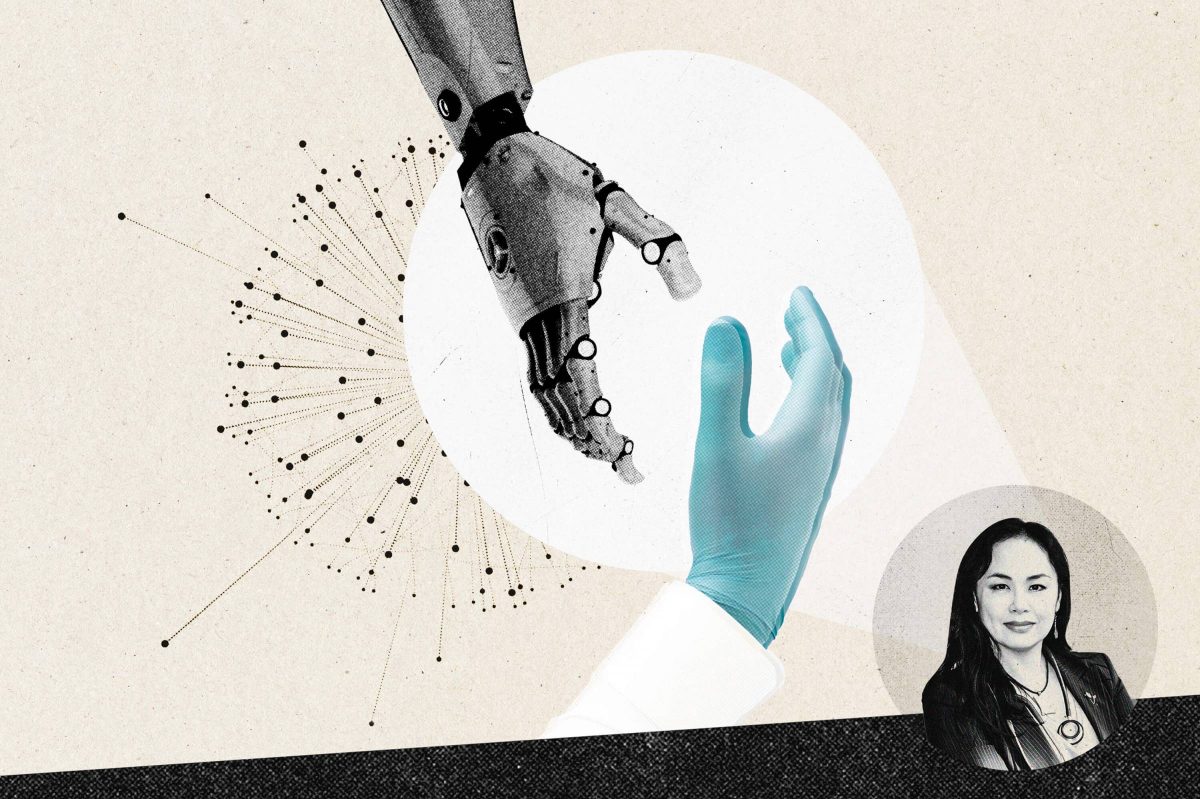
Will AI Heal Our Medical System?
It may not be a medical droid tending to your robotic hand. Or a physician curing your ailment via hologram. But the revolutionary potential of artificial intelligence is far from fiction, says
Dr. Denise Koh [MPH/08], an assistant professor in the Max Rady College of Medicine and Manitoba’s former chief occupational medical officer.
She co-authored Artificial Intelligence in Medicine: A Compilation of Stories from Doctors Across Multiple Disciplines on AI Breakthroughs, Challenges, and Potentials in the Healthcare System.
“The biggest benefits are that AI is very powerful and its speed of evolution is quite amazing—we can take advantage of that,” says Koh, who’s become an outspoken advocate for its application in health care.
Medical experts—from an obstetrician to a plastic surgeon to an oncologist—wrote chapters in the 2023 book, aimed at readers seeking a deeper understanding (and even investment options across various medical disciplines) as human and machine increasingly align.
Koh, who helped steer the province’s workplace COVID-19 response, predicts that conquering burnout in health-care professionals will be one of AI’s biggest contributions. Also a life coach and motivational speaker, Koh founded the MedResRx Hypnotherapy app to address work-related issues as well as anxiety, weight management and addictive behaviours. She runs a support network for Canadian physicians and medical trainees. And she launched a national suicide log of those navigating this high-stress profession.
A more balanced workload benefits not just overwhelmed physicians, says Koh.
“AI makes previously undoable tasks by humans doable. We can offload those tasks onto very powerful, fast, accurate computers, which then allows us to focus on the important people tasks, like connecting and really caring for patients.”
Koh says while physicians today collect lots of information from a patient it’s not connected to data sets in a way that facilitates their analysis of the condition at hand. AI could do the digitizing, mining, and comparisons on the spot. A more nuanced data-informed approach means a patient could also leave with relevant reports from their appointment.
“How often have people gone to the doctor and don’t remember what they’re supposed to do afterwards?” says Koh. “Finally it wouldn’t be so reliant on a patient’s memory.”
More personalized medicine using AI could also help better predict outcomes of different drugs or therapies and improve specialized diagnosis. Koh says AI algorithms have proven to be highly accurate in diagnosing cancer, heart diseases and neurological disorders—even better than trained radiologists—which could lead to earlier, more effective treatments.
“There are a lot of uses around radiology—imaging such as X-rays or CT scans—and being able to identify things at a level that’s more accurate, predictive and reliable,” says Koh. “There are so many things AI could and should be used for.”
The biggest hurdle at the moment, she says, is simply getting everyone to be open to the technology.
“It’s evolving at such a rapid pace. I’m not worried that we won’t find a solution to some long-standing problems anymore—it’s more that certain people need to embrace AI and support looking into it.”
FIVE WAYS UM PUTS AI INTO ACTION
- To develop new drugs. AI can significantly reduce how long it takes to find a lead in the pursuit of new small molecule medicines. Faculty of Science researchers Jörg Stetefeld and Mark Fry partnered with AI giant Atomwise to speed up their exploration of therapies for coronaviruses.
- To combat emerging cyber security threats. Azadeh Tabiban, an assistant professor in computer science, is collaborating on a multi-university research project to make 5G networks more secure using AI-based security solutions.
- To shape business education and research. Wenxi Pu, assistant professor in the Asper School of Business, incorporates AI into curriculum, encouraging students to collaborate with ChatGPT with a critical eye. Pu also researches automated video job interviewing, where algorithms analyze a potential hire’s recorded response to questions, assessing not just their answers but tone of voice and facial expressions.
- To support dementia patients. The College of Rehabilitation Sciences developed telepresence robots so those with dementia can interact with their caregivers from afar. They stay connected by seeing their caregiver on the screen and hearing their voice.
- To make music in new ways. Örjan Sandred, professor of composition in the Desautels Faculty of Music, sees AI as a tool for new forms of expression. By combining human inventiveness with this tech, Sandred employs advanced algorithms to compose new musical pieces.







I completely agree with the author’s sentiment that AI has the potential to revolutionize the medical field. As a healthcare professional, I have seen firsthand the benefits of AI in diagnosis and treatment. However, I also recognize the importance of addressing the ethical and regulatory issues surrounding AI in medicine. It is crucial that we ensure that AI is used responsibly and ethically to benefit patients rather than perpetuating existing inequalities.